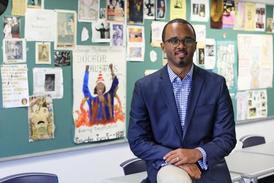As a music teacher, Dr. Ramon Goings began noticing a disturbing trend among the students that he was teaching.
“More and more Black boys who looked like me were being pushed into special education,” says Goings, who eventually went back to school and then became certified to teach special education.
Increasingly frustrated and concerned by this dilemma, Goings encountered barriers from administrators who, he says, often placed Black boys into special education and kept them there because of funding purposes.
 Dr. Ramon Going
Dr. Ramon GoingInitially, Goings, who held teaching positions in several urban school districts including Baltimore City, had plans of becoming a school principal. But his interest in research forced him to change his career trajectory and led him to pursue a doctoral degree in educational leadership at Morgan State University.
“I liked the thought of becoming a professor,” says Goings, who graduated in 2008 from Lynchburg College with a bachelor’s in music education.
This fall, Goings began a tenure-track teaching position as an assistant professor of educational leadership at Loyola University Maryland. Even as a doctoral student at Morgan, though, he was catching the attention of well-known scholars, such as Dr. Donna Ford of Vanderbilt University, for his groundbreaking research on Black males.
“Dr. Ramon Goings is not only an upcoming scholar and leader, he also is a mentor in the early stage of his career,” says Ford. “This is rare and he should be replicated.”
Goings credits Ford for mentoring and grooming him on how to become a professor and excel within the academy. And by the summer of 2014, while he was deeply engaged in writing his dissertation, he says that he started to think of himself as a scholar.
Goings’ pathway to the professoriate was no easy journey. Along the way, he encountered some bumps. Growing up in Stamford, Connecticut, his mother switched him from public to private school during the seventh grade after he was “falling in the wrong crowd.”
That switch changed his outlook on education and he became determined more than ever to receive an advanced degree.
“I developed a fire in my belly to complete my education,” he says, adding that he ultimately settled on Morgan State University to pursue his doctoral studies because he wanted a Black college experience.
“I wanted to be somewhere where the professors looked like me,” he says, adding that, by the time he entered the job market, he had already published in some leading journals.
Now, in his teaching role at Loyola University Maryland, Goings is training graduate students, many of whom are current teachers who are looking to earn their administration certification and degree to become a school principal.
‘It’s been pretty good so far,” he says of his first semester in the classroom. “I can relate to my students about their experiences and what they’re going through.”
Goings is interested in examining the experiences of nontraditional-age students who return to college to pursue their degree. His particular focus is on Black males, but he says that the experiences of his mother, who returned to college after sacrificing to put him through college, has always been a motivating factor.
“I went to college and forced her to go back,” he says, adding that very little research has been done on this growing demographic.
Goings is a co-editor of the book Graduate Education at Historically Black Colleges and Universities: A Student Perspective (Routledge Press) and is the recipient of the 2016 College Board Professional Fellowship. He is currently editor of the Journal of African American Males in Education.
Ford says that Goings, who was a 2013 educational policy fellow with the White House Initiative on Educational Excellence for African Americans, continues to impress her with his research.
“Dr. Ramon Goings is taking educational leadership to the next level when it comes to being cultural responsive and competent,” says Ford. “If you want to see what a competitive young scholar looks like, then look at the prolific work of Dr. Ramon Goings. He needs his own hashtag.”
















